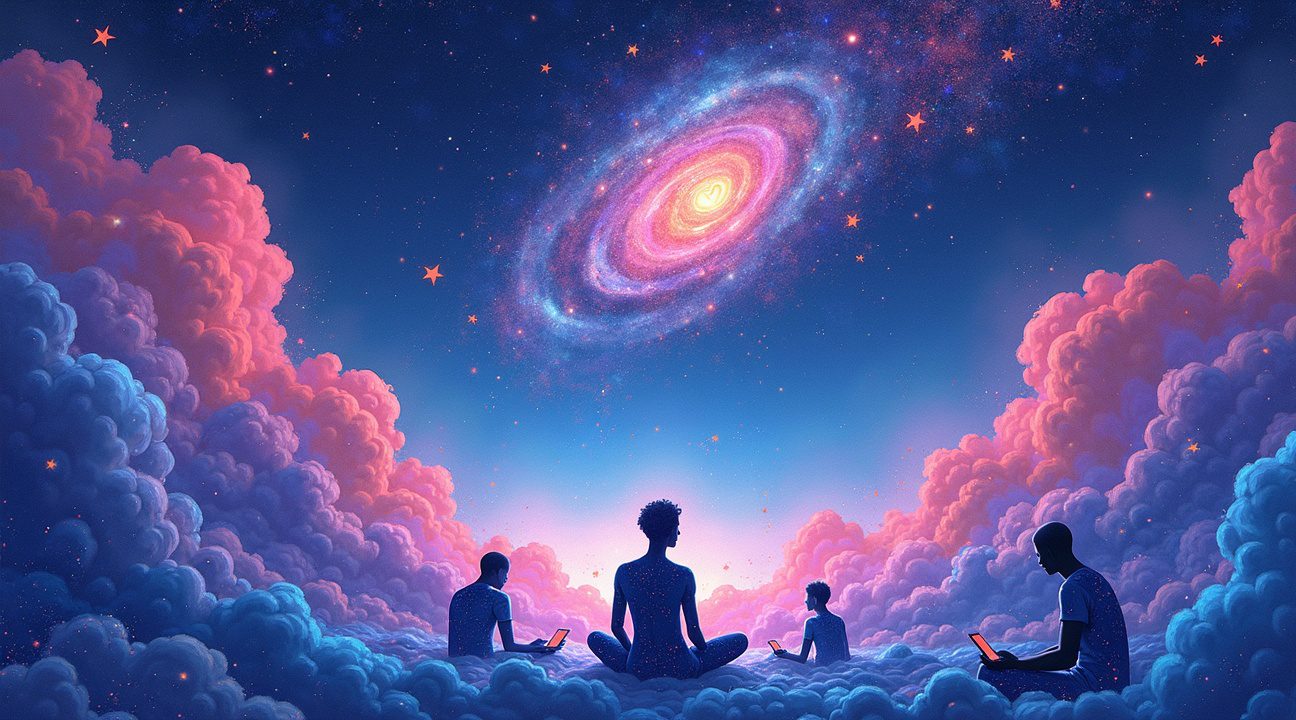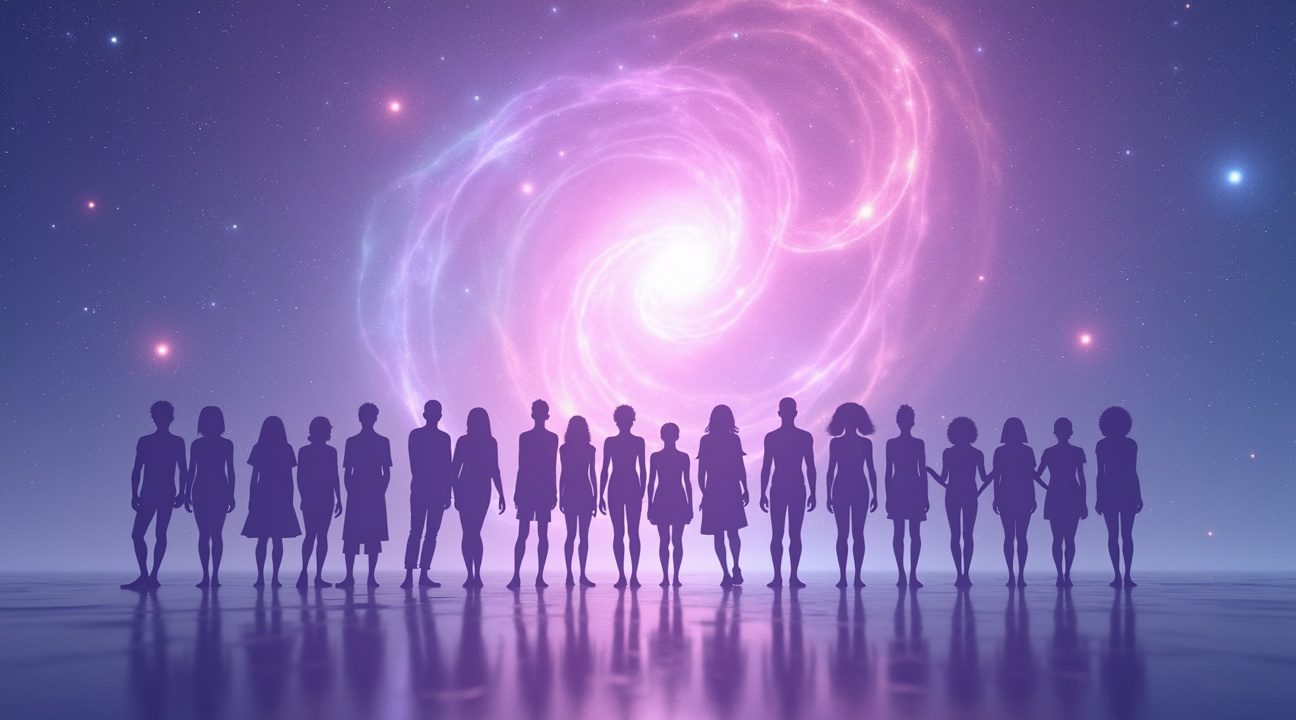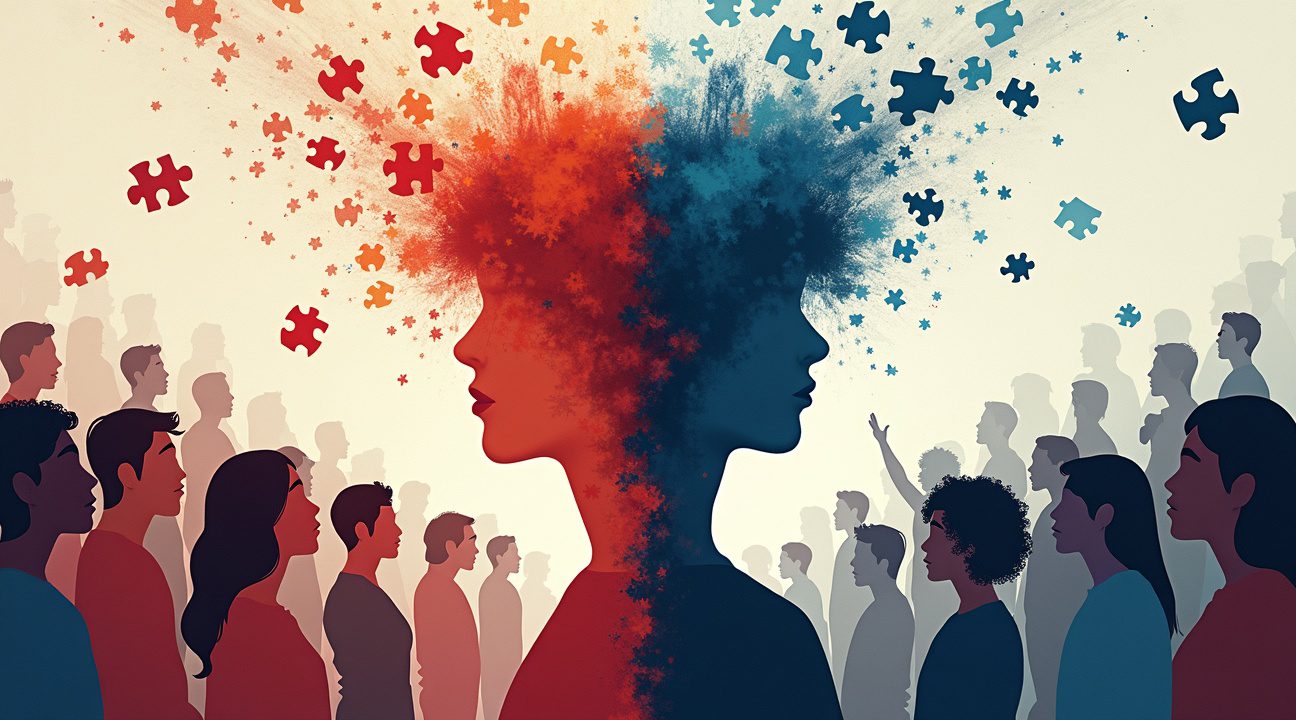Nebulasexual represents an emerging sexual orientation identity created specifically for neurodivergent individuals who experience uncertainty or confusion about whether they feel sexual attraction at all. The term has gained recognition as more people discover language that validates their unique experiences with attraction. This identity falls under the quoisexual umbrella and acknowledges how neurodivergence—including autism, ADHD, and OCD—can fundamentally affect how someone processes and interprets their own feelings of attraction.
Key Takeaways
- Nebulasexual describes neurodivergent individuals who struggle to determine if they experience sexual attraction, with their feelings remaining foggy or unclear rather than fitting traditional attraction categories.
- The term exclusively applies to neurodivergent people, recognizing that neurological differences significantly impact how someone experiences and categorizes attraction compared to neurotypical processing patterns.
- Online communities report finding relief and validation through this label, helping them reframe previously confusing feelings as legitimate experiences rather than problems to solve.
- The identity fits within the broader LGBTQ+ spectrum under quoisexual, alongside related orientations like graysexual, demisexual, and other identities on the asexual spectrum.
- Despite its usefulness to many, the emergence of highly specific identity labels has sparked debate about whether such terminology clarifies or complicates discussions around human sexuality.
Further Exploration
If you’d like to explore more about quoisexual identities and how they relate to neurodivergence, consider visiting this overview of nebulasexual on the LGBTQIA Wiki. It’s a helpful resource with inclusive explanations for emerging identity terms.
The Cloudy Nature of Attraction: What Nebulasexual Really Means
I find it fascinating how new terminology continues to emerge within the spectrum of sexual orientation, particularly those that acknowledge the unique experiences of neurodivergent individuals. Nebulasexual represents one such identity that’s gaining recognition among people who experience attraction in ways that don’t fit traditional frameworks.
The term nebulasexual falls under the quoisexual umbrella, describing individuals who struggle to determine whether they experience sexual attraction at all. This uncertainty isn’t simply confusion or indecision—it’s a fundamental difficulty in parsing their own attraction patterns, often linked to neurodivergence such as autism, ADHD, or OCD.
Etymology and Core Meaning
The word “nebula” comes from Latin, meaning “clouded” or “unclear,” which perfectly captures the essence of this orientation. Those who identify as nebulasexual describe their attraction as foggy, hazy, or difficult to pin down. It’s not that they don’t experience feelings—rather, they can’t definitively categorize whether what they’re feeling constitutes sexual attraction in the conventional sense.
This orientation is exclusively for neurodivergent people, acknowledging that neurological differences can significantly impact how someone experiences and interprets their own feelings of attraction. The brain processes involved in recognizing, categorizing, and understanding attraction may function differently for neurodivergent individuals.
Reframing Experience Positively
What makes the nebulasexual identity particularly powerful is how it reframes what might previously have been seen as confusion or abnormality. Instead of viewing uncertain attraction as a problem to solve, this terminology validates it as a legitimate way of experiencing sexuality. For many neurodivergent people, this language provides relief from the pressure to fit into clear-cut categories.
The emergence of terms like nebulasexual reflects a broader understanding of how neurodivergence intersects with sexuality. Traditional models of attraction often assume neurotypical processing patterns, leaving many neurodivergent individuals feeling disconnected from standard descriptions of sexual orientation. By creating specific language for these experiences, the community acknowledges that attraction exists on multiple spectrums, influenced by neurological as well as personal factors.
For those identifying as nebulasexual, having this terminology means they can describe their experience without constantly explaining or justifying why their attraction doesn’t fit neat categories. It’s about finding community with others who share similar experiences of ambiguous or unclear attraction patterns.
How Neurodivergent Brains Experience Attraction Differently
Neurodivergent individuals often describe attraction in ways that challenge conventional understanding. Those with autism spectrum disorder, ADHD, and obsessive-compulsive disorder frequently report experiencing attraction as fluid, ambiguous, or completely absent from traditional categories. These unique perspectives shed light on why labels like nebulasexual resonate with many in the neurodivergent community.
The Blurred Lines of Attraction Types
Many neurodivergent people struggle to distinguish between different forms of attraction that neurotypical individuals might easily separate. They often describe confusion about whether what they’re feeling constitutes sexual, aesthetic, or emotional attraction. An autistic person might feel drawn to someone’s intelligence or the way they organize their thoughts, yet remain uncertain whether this constitutes romantic interest or simply fascination with a particular trait.
This ambiguity extends beyond simple categorization. Some individuals with ADHD report intense fixations on specific people that feel overwhelming but don’t align with traditional romantic or sexual frameworks. They question whether these feelings represent genuine attraction or simply reflect their brain’s tendency to hyperfocus on particular stimuli.
The experience becomes even more complex for those who describe feeling “nothing” about sexual relationships entirely. Many autistic individuals report neither desire nor disgust toward intimate connections, existing in a space that feels fundamentally different from both sexual and asexual identities. They attribute this emotional neutrality directly to how their neurodivergent brains process social and physical connections.
OCD can add another layer of uncertainty, as intrusive thoughts about attraction can make individuals question the authenticity of their feelings. They might wonder whether their romantic inclinations stem from genuine emotion or represent another manifestation of their condition’s compulsive patterns.
These lived experiences highlight why nebulasexual identity appeals to neurodivergent individuals. The label acknowledges that attraction exists on a spectrum that doesn’t always fit neat categories. For someone whose brain processes information differently, the freedom to exist in undefined space feels more authentic than forcing themselves into established boxes.
Understanding these perspectives requires recognizing that neurodivergent brains don’t simply experience attraction differently—they may experience entirely different types of attraction that current language struggles to capture. This reality makes nebulasexual identity not just valid but necessary for many people seeking to understand their own emotional landscape.

Voices from the Nebulasexual Community
Social media platforms and online forums have become vital spaces where neurodivergent individuals share their experiences with nebulasexuality, offering authentic insights into how this identity helps them make sense of previously confusing feelings. These personal accounts reveal the profound relief many find in discovering a term that validates their unique relationship with attraction.
Personal Stories and Community Support
Reddit discussions frequently feature individuals expressing excitement about finally finding language for their experiences. One community member shared their revelation: “I literally cannot tell. I just get feelings, and I don’t know what they mean! Also, I am neurodivergent, so that checks out. I’m definitely nebulasexual. New label time!” This sentiment echoes throughout various forum discussions, where people describe the clarity that comes with having a specific term for their experiences.
The psychological impact of intrusive thoughts on attraction comprehension appears as a recurring theme in these testimonies. Another forum participant explained: “The intrusive thoughts make it so hard to know what’s ME and what’s just my brain being chaotic. This label helps me feel less broken and more understood.” These accounts highlight how nebulasexuality provides not just identification but also validation for those who’ve struggled with self-understanding.
Community members frequently acknowledge the broader neurodivergent experience in relation to attraction patterns. One thoughtful contributor observed: “Many autistic people, at least as far as I can see, experience attraction in very different and nuanced ways than what the neurotypical norm posits, and I’m glad we’re gradually giving these ideas a platform.” This perspective demonstrates growing awareness within neurodivergent communities about the need for more inclusive language around sexuality and attraction.
These lived experiences collectively paint a picture of individuals who’ve long felt confused or isolated by their attraction patterns finally finding community and understanding. The testimonies emphasize how nebulasexuality serves as more than just a label – it functions as a bridge to self-acceptance and connection with others who share similar experiences. Forum discussions continue to grow as more people discover this identity and contribute their own stories to the expanding conversation about neurodivergent sexuality.
How Nebulasexual Fits Within the Broader LGBTQ+ Spectrum
The appearance of nebulasexual as an identity marks a significant shift in how people understand and categorize sexual orientation. This emerging label reflects a growing movement within the LGBTQ+ community to create terminology that validates experiences previously overlooked by traditional sexuality frameworks.
Nebulasexual sits comfortably under the quoisexual umbrella, which encompasses individuals whose relationship with sexual attraction remains unclear or difficult to define. Unlike questioning individuals who experience temporary uncertainty while exploring their identity, nebulasexual people embrace ongoing ambiguity as a permanent aspect of their orientation. This distinction proves particularly important for neurodivergent individuals whose cognitive processing patterns create unique relationships with sexual attraction and desire.
Related Identities and Spectrum Connections
Several related identities share common ground with nebulasexual experiences, creating a rich tapestry of orientation possibilities:
- Graysexual individuals experience infrequent sexual attraction or maintain uncertain interest in sexual activity, often falling between asexual and allosexual experiences.
- Abrosexual people encounter fluid sexuality that changes over time, with attractions shifting between different orientations and intensities.
- Demisexual individuals develop sexual attraction only after forming strong emotional bonds with specific people.
- Asexual spectrum identities encompass various experiences of limited or absent sexual attraction.
These identities demonstrate how modern LGBTQ+ understanding has expanded beyond binary or fixed categories. Each label provides language for experiences that don’t conform to heteronormative assumptions about attraction and desire. The nebulasexual identity particularly resonates with neurodivergent communities, where processing differences can make traditional sexual orientation labels feel inadequate or misaligned.
The broader significance extends beyond individual validation. These emerging labels challenge society’s tendency to categorize sexuality in rigid terms. They acknowledge that human experience is complex and that some people benefit from having language that embraces uncertainty rather than demanding clarity. This evolution reflects the LGBTQ+ community’s commitment to inclusion and recognition of diverse experiences, particularly those influenced by neurological differences.
Contemporary discussions around sexual orientation increasingly recognize that identity labels serve different purposes for different people. Some individuals find comfort in specific terminology that describes their exact experience, while others prefer broader categories or reject labels entirely. Nebulasexual provides an option for those whose relationship with attraction feels inherently unclear, offering community and validation without requiring resolution of that uncertainty.

The Growing Debate Around New Sexual Identity Labels
The emergence of nebulasexual identity has sparked considerable discussion across both neurodivergent communities and broader society. While many within autism and ADHD communities have embraced this label with enthusiasm, others question whether such specific terminology serves a meaningful purpose or simply adds confusion to already complex identity conversations.
Community Reception and Criticism
Neurodivergent spaces have largely welcomed nebulasexual as a validation of their lived experiences with attraction and identity. These communities report finding clarity in having language that addresses their unique challenges with distinguishing platonic from romantic feelings. However, skeptics raise concerns about the practical implications of increasingly granular labels.
Critics argue that hyper-specific identity categories might complicate rather than clarify meaningful discussions about human sexuality. Some suggest these new terms could fragment communities rather than unite them, creating divisions where solidarity once existed. Others worry about the potential for labels to become prescriptive rather than descriptive, limiting rather than expanding how people understand themselves.
Broader Identity Evolution Context
This debate extends far beyond nebulasexual identity alone. Society continues grappling with expanding recognition of diverse gender and sexual identities, challenging traditional binary frameworks that have dominated cultural understanding for generations. The conversation reflects deeper questions about how humans categorize and express their most fundamental aspects of self.
The distinction between biological sex and social gender constructions remains a contentious topic, with nebulasexual identity adding another layer to these discussions. Some view this expansion as natural progress in understanding human diversity, while others see it as unnecessary complexity that obscures rather than illuminates human experience.
Current evidence supporting nebulasexual identity remains largely anecdotal or community-sourced. Personal testimonies and online forum discussions provide the primary documentation of this phenomenon, highlighting a significant gap in formal research. The absence of comprehensive statistics or surveys on prevalence makes it challenging to assess the scope and significance of this identity within broader populations.
Academic researchers haven’t yet conducted extensive studies on nebulasexual experiences, leaving many questions unanswered about its relationship to other aspects of neurodivergence and sexuality. This lack of formal research fuels both sides of the debate, with supporters pointing to lived experiences as valid evidence while critics call for more rigorous scientific investigation.
The conversation around nebulasexual identity ultimately reflects broader tensions about who gets to define identity categories, how society validates different forms of human experience, and whether increased specificity in labeling enhances or hinders understanding of human diversity. These discussions will likely continue evolving as more people explore and articulate their experiences with attraction, identity, and the intersection of neurodivergence with sexuality.

The Importance of Language for Marginalized Communities
Recognition and language serve as powerful tools that promote well-being and self-understanding among marginalized groups. When individuals can name their experiences, they gain clarity about their identity and find validation in their unique perspectives. This naming process transforms confusion into understanding and creates pathways for community connection.
Validation Through Precise Terminology
Nebulasexual provides neurodivergent individuals with crucial validation for experiences that were previously difficult to articulate. I’ve observed how having the right words can shift someone’s entire relationship with their identity. Instead of feeling broken or confused about their attraction patterns, neurodivergent people can now frame their experiences as valid variations of human sexuality.
This label helps individuals recognize that their neurodivergence affects how they experience attraction in ways that don’t align with conventional expectations. For many, this recognition brings relief and reduces the internal struggle that comes from trying to fit into categories that don’t match their lived reality. The language acknowledges that neurodivergent brains process emotions, social connections, and attraction differently.
A Broader Movement Toward Inclusion
The emergence of nebulasexual represents part of a larger movement that embraces inclusive language acknowledging diverse human experiences. Language evolves to meet the needs of communities who have been overlooked or misunderstood by existing terminology. I see this as a natural progression in how society becomes more aware of neurodiversity and its effects on various aspects of life.
This shift reflects growing understanding that human sexuality exists on multiple spectrums, influenced by neurological differences, personal experiences, and individual processing styles. Communities benefit when they can describe their experiences accurately rather than forcing themselves into ill-fitting categories. The validation that comes from precise language helps reduce isolation and builds bridges between people with similar experiences.
Having appropriate terminology allows marginalized communities to advocate for their needs more effectively. When experiences have names, they become easier to discuss in therapeutic settings, educational contexts, and social situations. This linguistic recognition often serves as the first step in broader acceptance and understanding within society.
Sources:
Voices from the Nebulasexual Community – Reddit testimonies, forum discussions


